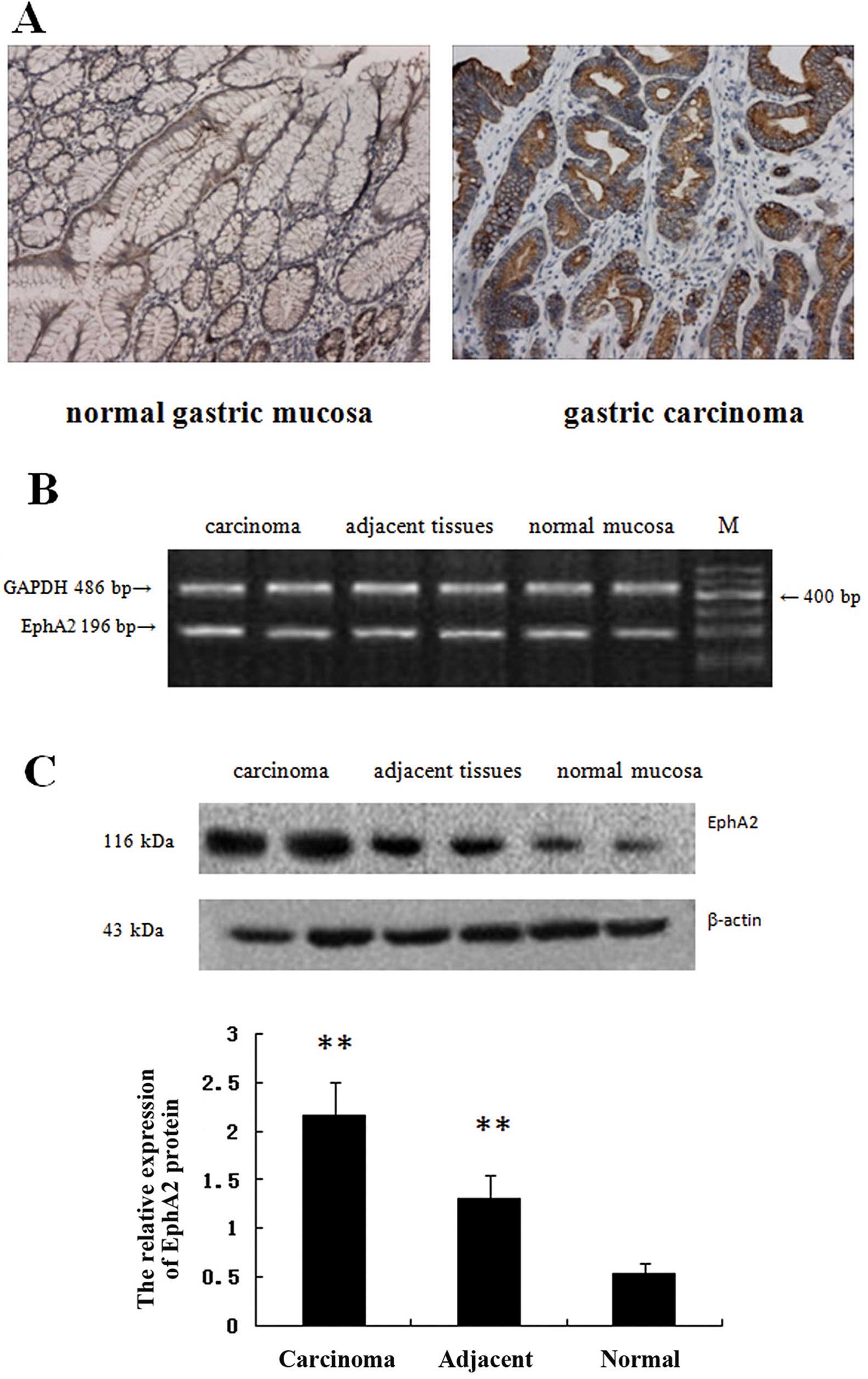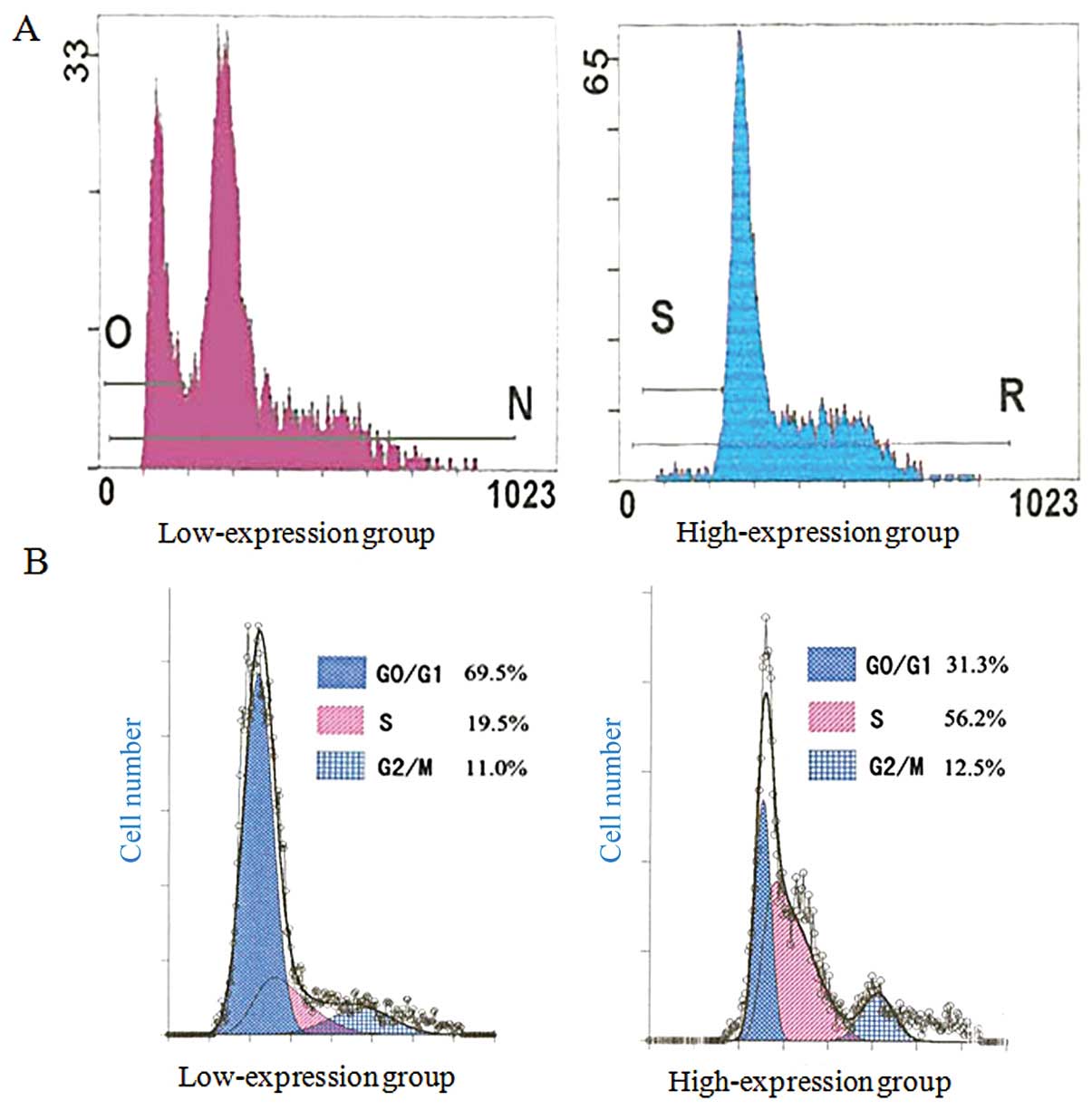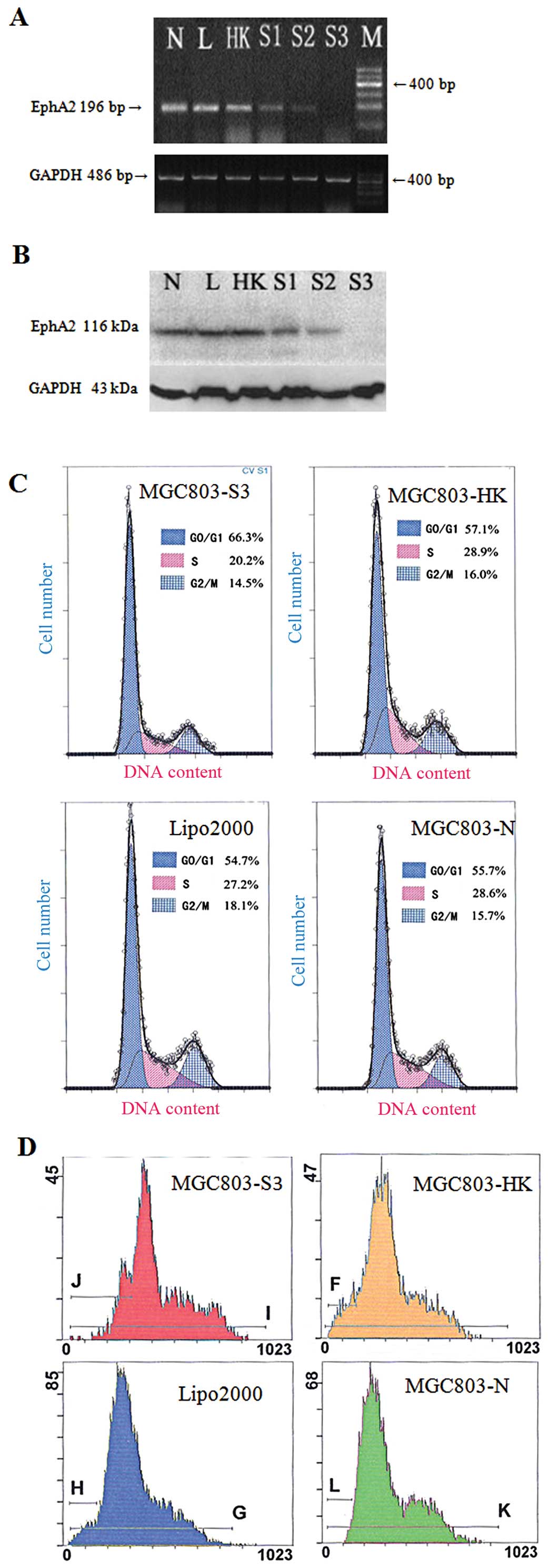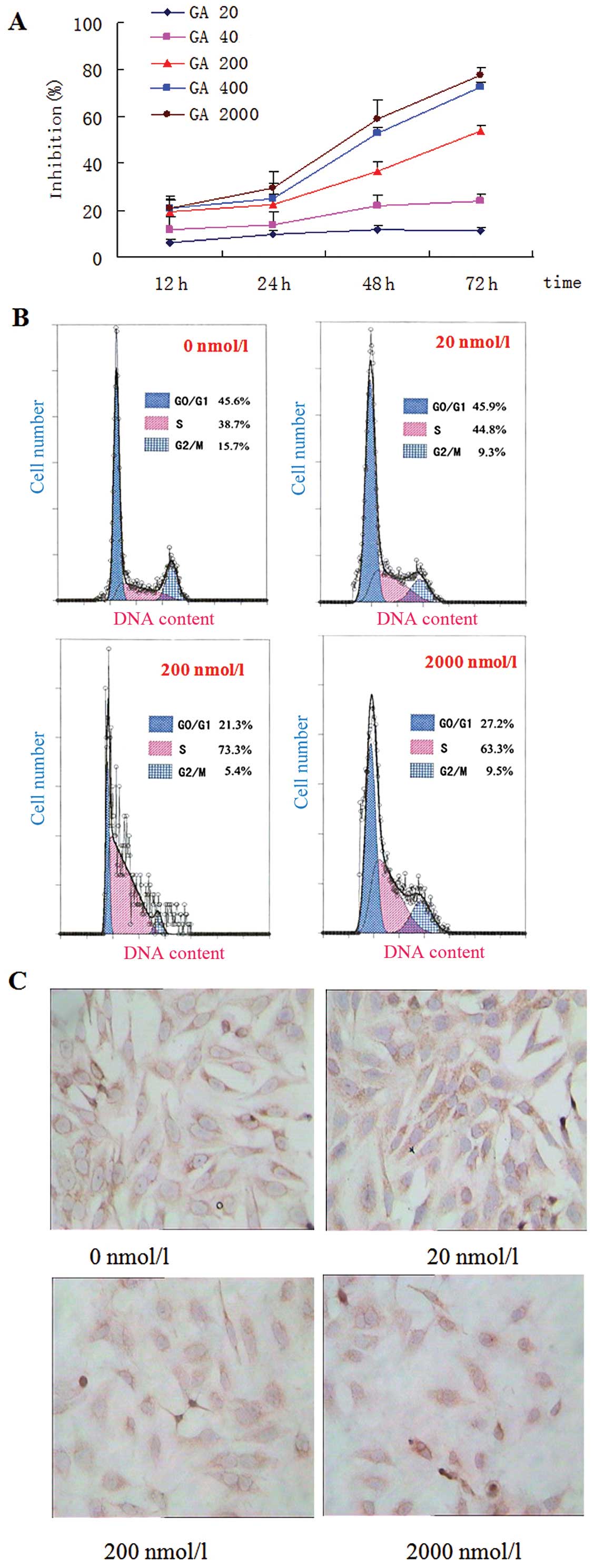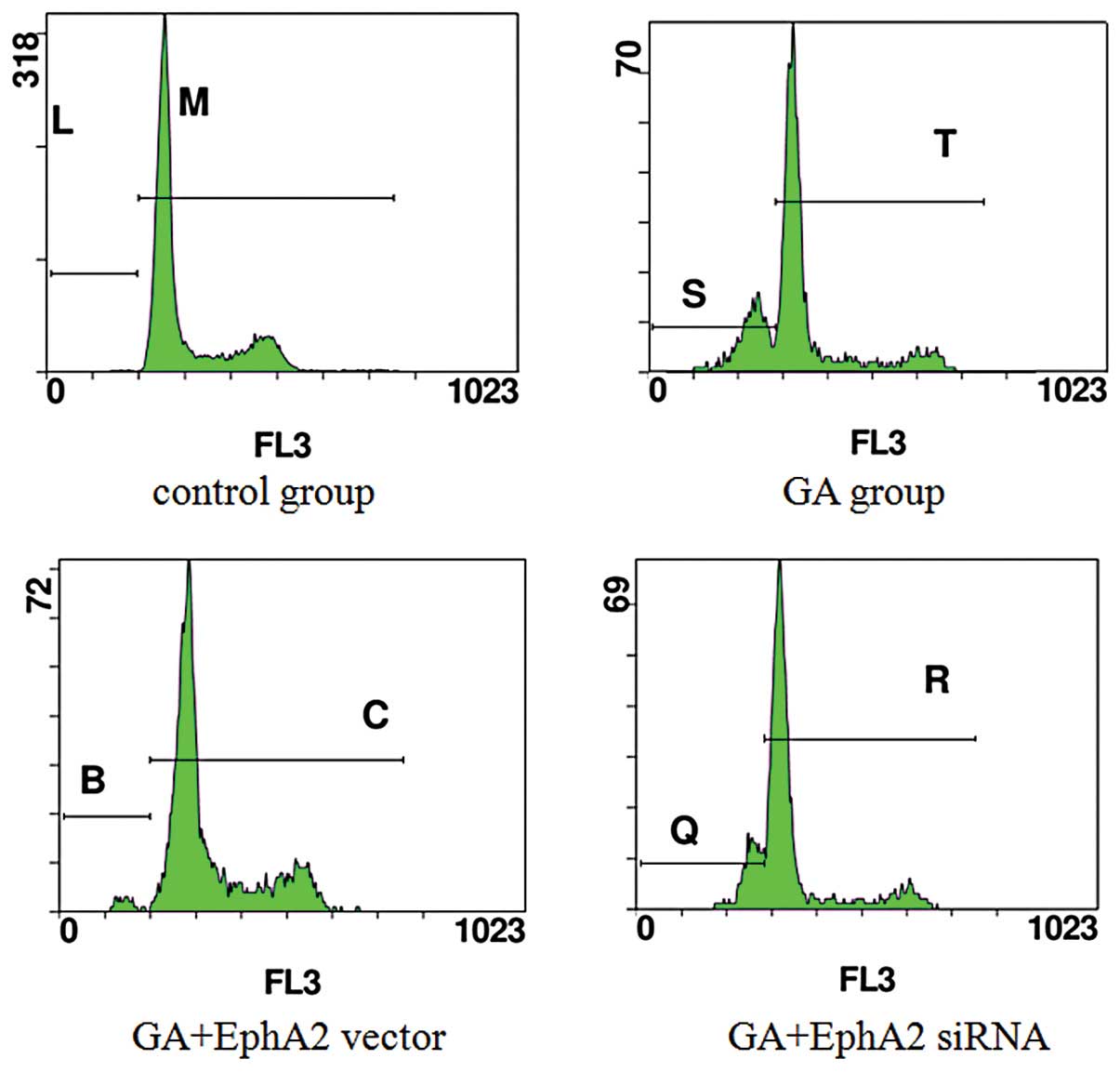|
1
|
Nakamoto M and Bergemann AD: Diverse roles
for Eph family of receptor tyrosine kinases in carcinogenesis.
Microsc Res Tech. 59:58–67. 2002. View Article : Google Scholar : PubMed/NCBI
|
|
2
|
Fang WB, Brantley-Sieders DM, Parker MA,
Reith AD and Chen J: A kinase-dependent role for EphA2 receptor in
promoting tumor growth and metastasis. Oncogene. 24:7859–7868.
2005. View Article : Google Scholar : PubMed/NCBI
|
|
3
|
Miyazaki T, Kato H, Fukuchi M, Nakajima M
and Kuwano H: EphA2 overexpression correlates with poor prognosis
in esophageal squamous cell carcinoma. Int J Cancer. 103:657–663.
2003. View Article : Google Scholar : PubMed/NCBI
|
|
4
|
Orsulic S and Kemler R: Expression of Eph
receptors and ephrins is differentially regulated by E-cadherin. J
Cell Sci. 113:1793–1802. 2000.PubMed/NCBI
|
|
5
|
Trojandt S, Reske-Kunz AB and Bros M:
Geldanamycin-mediated inhibition of heat shock protein 90 partially
activates dendritic cells, but interferes with their full
maturation, accompanied by impaired upregulation of RelB. J Exp
Clin Cancer Res. 33:162014. View Article : Google Scholar
|
|
6
|
Zeng G, Hu Z, Kinch MS, Pan CX, Flockhart
DA, Kao C, Gardner TA, Zhang S, Li L, Baldridge LA, Koch MO,
Ulbright TM, Eble JN and Cheng L: High-level expression of EphA2
receptor tyrosine kinase in prostatic intraepithelial neoplasia. Am
J Patho1. 163:2271–2276. 2003. View Article : Google Scholar : PubMed/NCBI
|
|
7
|
Feng X, Hao J, Liu Q, Yang L, Lv X, Zhang
Y, Xing L, Xu N and Liu S: HMGB1 mediates IFN-γ-induced cell
proliferation in MMC cells through regulation of cyclin D1/CDK4/p16
pathway. J Cell Biochem. 113:2009–2019. 2012.
|
|
8
|
Hao J, Zhang YJ, Lv X, Xu N, Liu QJ, Zhao
S, Feng XJ, Xing LL, Kang PP, Li GY and Liu SX: IFN-γ induces
lipogenesis in mouse mesangial cells via the JAK2/STAT1 pathway. Am
J Physiol Cell Physiol. 304:c760–c767. 2013.
|
|
9
|
Dodelet VC and Pasquale EB: Eph receptors
and ephrin ligands: embryogenesis to tumorigenesis. Oncogene.
19:5614–5619. 2000. View Article : Google Scholar : PubMed/NCBI
|
|
10
|
Duxbury MS, Ito H, Zinner MJ, Ashley SW
and Whang EE: Ligation of EphA2 by Ephrin A1-Fc inhibits pancreatic
adenocarcinoma cellular invasiveness. Biochem Biophys Res Commun.
320:1096–1102. 2004. View Article : Google Scholar : PubMed/NCBI
|
|
11
|
Thaker PH, Deavers M, Celestino J,
Thornton A, Fletcher MS, Landen CN, Kinch MS, Kiener PA and Sood
AK: EphA2 expression is associated with aggressive features in
ovarian carcinoma. Clin Cancer Res. 10:5145–5150. 2004. View Article : Google Scholar : PubMed/NCBI
|
|
12
|
Wykosky J, Gibo DM, Stanton C and Debinski
W: EphA2 as a novel molecular marker and target in glioblastoma
multiforme. Mol Cancer Res. 3:541–551. 2005. View Article : Google Scholar : PubMed/NCBI
|
|
13
|
Liu F, Park PJ, Lai W, Maher E,
Chakravarti A, Durso L, Jiang X, Yu Y, Brosius A, Thomas M, Chin L,
Brennan C, DePinho RA, Kohane I, Carroll RS, Black PM and Johnson
MD: A genome-wide screen reveals functional gene clusters in the
cancer genome and identifies EphA2 as a mitogen in glioblastoma.
Cancer Res. 66:10815–10823. 2006. View Article : Google Scholar : PubMed/NCBI
|
|
14
|
Zelinski DP, Zantek ND, Stewart JC,
Irizarry AR and Kinch MS: EphA2 overexpression causes tumorigenesis
of mammary epithelial cells. Cancer Res. 61:2301–2306.
2001.PubMed/NCBI
|
|
15
|
Hess AR, Seftor EA, Gruman LM, Kinch MS,
Seftor RE and Hendrix MJ: VE-cadherin regulates EphA2 in aggressive
melanoma cells through a novel signaling pathway: implications for
vasculogenic mimicry. Cancer Biol Ther. 5:228–233. 2006. View Article : Google Scholar : PubMed/NCBI
|
|
16
|
Brantley-Sieders DM, Zhuang G, Hicks D,
Fang WB, Hwang Y, Cates JM, Coffman K, Jackson D, Bruckheimer E,
Muraoka-Cook RS and Chen J: The receptor tyrosine kinase EphA2
promotes mammary adenocarcinoma tumorigenesis and metastatic
progression in mice by amplifying ErbB2 signaling. J Clin Invest.
118:64–78. 2008. View
Article : Google Scholar
|
|
17
|
Fox BP and Kandpal RP: Invasiveness of
breast carcinoma cells and transcript profile: Eph receptors and
ephrin ligands as molecular markers of potential diagnostic and
prognostic application. Biochem Biophys Res Commun. 318:882–892.
2004. View Article : Google Scholar : PubMed/NCBI
|
|
18
|
Herrem CJ, Tatsumi T, Olson KS, Shirai K,
Finke JH, Bukowski RM, Zhou M, Richmond AL, Derweesh I, Kinch MS
and Storkus WJ: Expression of EphA2 is prognostic of disease-free
interval and overall survival in surgically treated patients with
renal cell carcinoma. Clin Cancer Res. 11:226–231. 2005.PubMed/NCBI
|
|
19
|
Merritt WM, Thaker PH, Landen CN Jr,
Deavers MT, Fletcher MS, Lin YG, Han LY, Kamat AA, Schmandt R,
Gershenson DM, Kinch MS and Sood AK: Analysis of EphA2 expression
and mutant p53 in ovarian carcinoma. Cancer Biol Ther. 5:1357–1360.
2006. View Article : Google Scholar : PubMed/NCBI
|
|
20
|
Abraham S, Knapp DW, Cheng L, Snyder PW,
Mittal SK, Bangari DS, Kinch M, Wu L, Dhariwal J and Mohammed SI:
Expression of EphA2 and Ephrin A-1 in carcinoma of the urinary
bladder. Clin Cancer Res. 12:353–360. 2006. View Article : Google Scholar : PubMed/NCBI
|
|
21
|
Larsen AB, Pedersen MW, Stockhausen MT,
Grandal MV, van Deurs B and Poulsen HS: Activation of the EGFR gene
target EphA2 inhibits epidermal growth factor-induced cancer cell
motility. Mol Cancer Res. 5:283–293. 2007. View Article : Google Scholar : PubMed/NCBI
|
|
22
|
Fang WB, Brantley-Sieders DM, Parker MA,
Reith AD and Chen J: A kinase-dependent role for EphA2 receptor in
promoting tumor growth and metastasis. Oncogene. 24:7859–7868.
2005. View Article : Google Scholar : PubMed/NCBI
|
|
23
|
Carles-Kinch K, Kilpatrick KE, Stewart JC
and Kinch MS: Antibody targeting of the EphA2 tyrosine kinase
inhibits malignant cell behavior. Cancer Res. 62:2840–2847.
2002.PubMed/NCBI
|
|
24
|
Zantek ND, Azimi M, Fedor-Chaiken M, Wang
B, Brackenbury R and Kinch MS: E-cadherin regulates the function of
the EphA2 receptor tyrosine kinase. Cell Growth Differ. 10:629–638.
1999.PubMed/NCBI
|
|
25
|
Macrae M, Neve RM, Rodriguez-Viciana P,
Haqq C, Yeh J, Chen C, Gray JW and McCormick F: A conditional
feedback loop regulates Ras activity through EphA2. Cancer Cell.
8:111–118. 2005. View Article : Google Scholar : PubMed/NCBI
|
|
26
|
Ui T, Morishima K, Saito S, Sakuma Y,
Fujii H, Hosoya Y, Ishikawa S, Aburatani H, Fukayama M, Niki T and
Yasuda Y: The HSP90 inhibitor 17-N-allylamino-17-demethoxy
geldanamycin (17-AAG) synergizes with cisplatin and induces
apoptosis in cisplatin-resistant esophageal squamous cell carcinoma
cell lines via the Akt/XIAP pathway. Oncol Rep. 31:619–24.
2014.PubMed/NCBI
|
|
27
|
Jilani K, Qadri SM and Lang F:
Geldanamycin-induced phosphatidylserine translocation in the
erythrocyte membrane. Cell Physiol Biochem. 32:1600–1609.
2013.PubMed/NCBI
|















